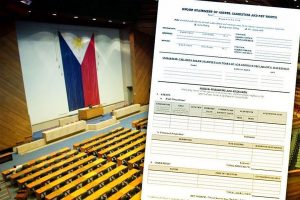By Justine Irish D. Tabile, Reporter
SOME TOP business groups on Thursday called for the public submission of statements of assets, liabilities, and net worth (SALN) by all government officials, as well as mandatory lifestyle checks to enforce accountability.
“Without rigorous verification, SALNs remain symbolic records rather than effective tools against corruption,” six groups, including the Makati Business Club (MBC) and the Management Association of the Philippines (MAP), said in a joint statement.
Other signatories of the statement include the Financial Executives Institute of the Philippines (FINEX), Shareholders’ Association of the Philippines, Justice Reform Initiative, and Institute for Solidarity in Asia.
The groups said lifestyle audits can be done much more easily as public officials and their family members’ digital footprints are more accessible these days. Social media posts can show their spending patterns, travel, social media activities, and luxury assets.
“They are essential to uncover if declared wealth aligns with actual living standards,” they added.
The Philippine government is investigating a multibillion-peso public works scandal involving government officials, lawmakers and private contractors.
This corruption scandal has sparked widespread outrage and street protests, especially after the spread of social media posts showing the lavish lifestyles of some officials, contractors and their family members who were tied to the scandal.
Amid the government probe, Ombudsman Jesus Crispin C. Remulla reopened public access to SALNs last month.
“While the recent Ombudsman decision restoring public access to SALNs is welcome, transparency alone is insufficient,” the groups said.
They noted that under Republic Act (RA) No. 1379, any property “manifestly out of proportion” to an official’s lawful income is presumed ill-gotten and subject to forfeiture.
“Lifestyle audits enable this legal presumption. Discrepancies uncovered through these checks must trigger immediate, impartial investigations and prosecutions under the Ombudsman’s constitutional mandate,” the groups said.
They also called on the public to report signs of “excessive or unexplained wealth” among public officials.
“The corruption we now see, we cannot unsee. We can no longer allow pilferage to prosper under the cover of pretense, political patronage, and public indifference,” they added.
Ederson DT. Tapia, a political science professor at the University of Makati, said that the lifestyle checks among politicians are “long overdue.”
“Mandatory lifestyle checks are feasible and long overdue,” he said in a Facebook Messenger chat.
“Today’s digital footprints make it much easier to validate whether an official’s declared wealth matches real-world spending and assets,” he added.
However, Mr. Tapia said it will be a challenge to ensure that tools are applied uniformly and not influenced by political interests.
“If enforced impartially, lifestyle checks can turn the SALN from a symbolic requirement into a genuine anti-corruption safeguard,” he added.
IBON Foundation Executive Director Jose Enrique “Sonny” A. Africa said that lifestyle checks are absolutely necessary, especially amid the calls for reform.
“The constitutional, statutory, and ethical basis is already sound and just made ineffectual by elite political opposition and capture of the government’s anti-corruption agencies,” he said in a Viber message.
“Overcoming this will be a key test of the Marcos administration’s sincerity in cracking down on corruption,” he added.
He said that with the advent of digital databases and artificial intelligence tools, the government now “cannot use technical infeasibility as an excuse.”
“The people and even the Constitution require the ‘highest standard of ethics’ for public officials. The corruption scandals are exposing how much dishonest wealth is amassed at the expense of the public welfare,” he said.
Meanwhile, Edmund S. Tayao, president and chief executive officer of Political Economic Elemental Researchers and Strategists, said that the SALNs and lifestyle checks are a temporary solution.
“It’s not going to hurt to improve the reporting of SALNs… On the other hand, whether or not we make it more comprehensive and complicated, there’s still no certainty that it will effectively improve accountability,” he said in a phone interview.
He said elected officials will have a way to hide ill-gotten wealth, highlighting the need to improve accountability by changing the whole political setup.
“We don’t have an existing political system. We call it a system, but anything and everything depends on the personality or the individual, which means that whoever runs for office will always be spending money as a person,” he said.
“Until such time that we change the political setup, where real political parties can really support qualified candidates to run for office and not for candidates to spend for their campaigns, this will be a vicious cycle,” he added.
Under the Constitution, every public official is mandated to submit a sworn SALN upon assuming office. However, high-ranking officials are required to make full public disclosure.
RA 6714 extended the SALN requirement to spouses and minor children, and also mandated annual updates.
The Anti-Graft and Corrupt Practices Act imposes penalties such as disqualification from public office and imprisonment.
Meanwhile, under the Plunder Law, those who amass ill-gotten wealth of at least P50 million face life imprisonment. The groups noted that the P50 million is “a low benchmark given what we now know.”
